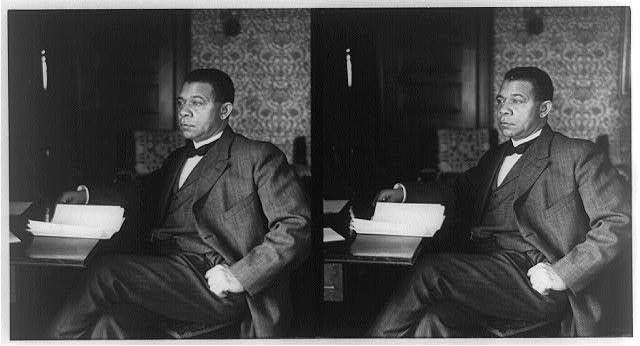New York Times Obituary - November 15, 1915
TUSKEGEE, Ala., Nov. 14.--Booker T. Washington, foremost teacher and leader of the negro race, died early today at his home here, near the Tuskegee Institute, which he founded and of which he was President. Hardening of the arteries, following a nervous breakdown, caused his death four hours after Dr. Washington arrived from New York.
Although he had been in failing health for several months, the negro leader's condition became serious only last week while he was in the East. He then realized the end was near, but was determined to make the last long trip South. He said often: "I was born in the South, have lived all my life in the South, and expect to die and be buried in the South."
Accompanied by his wife, his secretary, and a physician, Dr. Washington left New York for Tuskegee at 4 o'clock on Friday afternoon. He reached home last midnight, and died at 4:40 o'clock this morning. His last public appearance was at the national conference of Congregational churches in New York, where he delivered a lecture on Oct. 25. The funeral will be held at Tuskegee Institute on Wednesday morning at 10 o'clock.
Dr. Washington's Career
No one knows the day, nor even with certainty the year, of the birth of Booker T. Washington; but the day of his death was announced by telegraph and cable to many parts of the world.
He began life as "just another little nig***" on a plantation of a family named Burrows in Hale's Ford, Va. The month and year of his birth were probably April, 1858, although Dr. Washington himself was not sure of this. In the biographical paragraph under his name in "Who's Who in America," it is said that he was born "about 1859." The only certain fact is that he was born into slavery when negro mothers made no record of nor long remembered the date of a child's birth.
Soon after the close of the civil war the little negro boy went with his stepmother to Malden, West Va., where he worked in salt furnaces for nine moths in the year and attended school for three months. After several years of such life the boy obtained work in the kitchen of Mrs. Viola Ruffner, a New England woman who had married a Southerner. Mrs. Ruffner soon recognized the boy's eagerness and ability to advance himself, so she taught him the elementary subjects. Booker Washington felt grateful to her to the end of his life, because she really gave him his start.
He heard of the Hampton Institute, for negroes, in 1871, when he was about thirteen years old, and he decided at once to attend it. So, with the little money he had been able to save from his wages of $6 a week, he set out for Richmond, Va., hoping to earn enough there to enable him to go on to Hampton, which is near Norfolk. This was in 1871. Dr. Washington founded the Tuskeegee Institute just ten years later. He was admitted to the institute and was graduated at the head of his class in 1875, after working his way through the school.
After graduation Dr. Washington returned to Malden and taught school until he had earned enough to enable him to go to the Wayland Seminary in Washington, D. C., where he studied until 1879, when he was called to Hampton as a teacher in the institute. After he had taught for two years, in 1881 the State of Alabama voted to found an industrial institute for negroes similar to that at Hampton, and, after searching for a negro qualified to head the proposed institution, Dr. Washington was selected. This was his entrance into the "black belt" of the South, a chance which he had long desired, and when he assumed charge of the institute at Tuskegee, Ala., his real life's work began.
The Start of Tuskegee
The State had appropriated $2,000 a year, and it was the task of the negro to organize the school. How well he did this is shown by a comparison of statistics. The institute opened on July 4, 1881, with one teacher and thirty pupils. At that time it had neither land nor buildings, nothing but the $2,000 a year granted by the Alabama Legislature.
When the institute celebrated its twenty-fifth anniversary it owned 2,000 acres of land and eighty-three large and small buildings, which, with its equipment of live stock, stock in trade, and other personal property, were valued at $831,895. This did not include 22,000 acres of public land remaining unsold from the 25,000 acres granted by Congress, valued at $135,000, nor the endowment fund, which was $1,275,644. During the year there were more than 1,500 students enrolled in the school, more than 1,000 young men, and more than 500 young women. The students were trained in thirty-seven industries.
It was on the opening day of the Atlanta Exposition in 1895 that Dr. Washington became a national character. On that day he delivered an address that was heard by thousands and read by other thousands in far-away places with wonder that a man so wise and clear- seeing should arise from among his people to lead them upward. For it was because Dr. Washington stood out as a negro striving in a sensible and sincere way to help negroes that he commanded attention on that day in Atlanta.
His subject was "The New Negro," and white men saw in what he said a sane hope for the negro race and a real solution of the vexing "negro problem."
The character and difficulties of Dr. Washington's work are told in a magazine article written by him. When elected to organize the Tuskegee Institute, he traveled through the "black belt" in order to become acquainted with the people whom he was to teach.
"In the plantation districts," he wrote later, "I found large families, including visitors when any appeared, living and sleeping in a single room. I found them living on fat pork and corn bread, and yet not infrequently I discovered in these cabins sewing machines which no one knew how to use, which had cost as much as $60, or showy clocks which had cost as much as $10 or $12, but which never told the time. I remember a cabin where there was but one fork on the table for the use of five members of the family and myself, while in the opposite corner was an organ for which the family was paying $60 in monthly installments. The truth that forced itself upon me was that these people needed not only book learning, but knowledge of how to live; they needed to know how to cultivate the soil, to husband their resources, and make the most of their opportunities."
Men of Affairs Come to His Aid
Word of his aims, advertised to the world in the Atlanta speech, spread all over the country, and soon men and women of means began to want to assist Dr. Washington. Chief among these was Andrew Carnegie, who began by giving a $20,000 library to the institute, which he followed with a regular contribution of $10,000 a year. The climax of Mr. Carnegie's generosity toward the institute was reached in 1903, when he gave $600,000 to the endowment fund.
Among those who indorsed and supported Dr. Washington by act and speech were Presidents McKinley, Roosevelt, Taft, and Wilson; the officials of many States, and the heads of many institutions of learning. Though he never seemed to seek them, honors of all kinds were bestowed upon the negro. The degree of M. A. was conferred upon him by Harvard in 1896, and LL. D. by Dartmouth in 1901. In 1910, when Dr. Washington was in Europe, he was received by the King of Denmark, addressed the National Liberal Club in London, and visited Mr. Carnegie in Skibo Castle.
Among those who gave the most effectual assistance to Dr. Washington in his work was Robert Curtis Ogden, who died in Maine on Aug. 6, 1913. Mr. Ogden became interested in negro educational work through his association with General Samuel Chapman Armstrong, the founder of the Hampton Institute, and as the President of the Southern Educational Board he did much to overcome southern prejudice against the education of negroes and spread the knowledge of Hampton and Tuskegee among both the white and black people.
An incident of Dr. Washington's life that stirred up a controversy throughout the country was the occasion of his dining at the White House with President Roosevelt on Oct. 16, 1901. Dr. Washington went to the White House at the invitation of the President, and, when the news was spread abroad, thousands, both North and South, who were moved by race prejudice or by a belief that social equality between blacks and whites had been encouraged, became angry. Most of the criticism fell upon Colonel Roosevelt, but the incident served also to injure Dr. Washington's work in some parts of the South.
In addition to his work at Tuskegee and upon the lecture platform, Dr. Washington wrote a number of books and pamphlets upon the negro question. Chief among his works were: "Sowing and Reaping," 1900; "Up from Slavery," 1901; "Future of the America Negro," 1899; "Character Building," 1902; "The Story of My Life and Work," 1903; "Working with Hands," 1904; "Tuskegee and Its People," 1905; "Putting the Most Into Life," 1906; "Life of Frederick Douglass," 1907; "The Negro in Business," 1907; "The Story of the Negro," 1909; "My Larger Education," 1911, and "The Man Farthest Down," 1912.
Dr. Washington was married three times, and is survived by his third wife, two sons and a daughter.
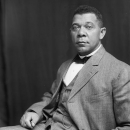
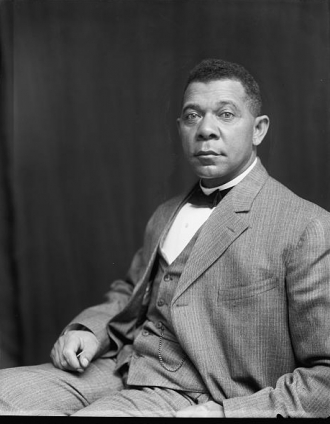
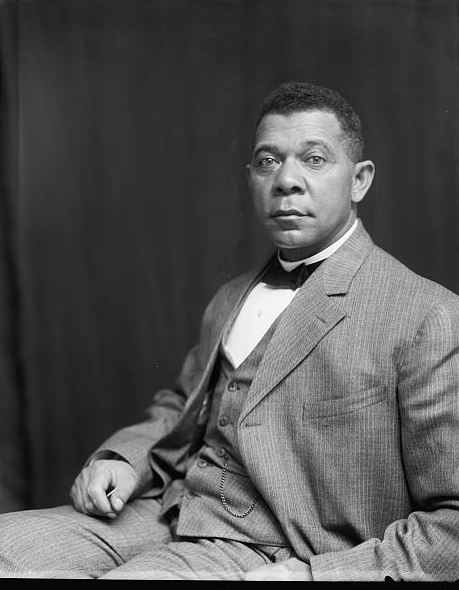
 AncientFaces
AncientFaces 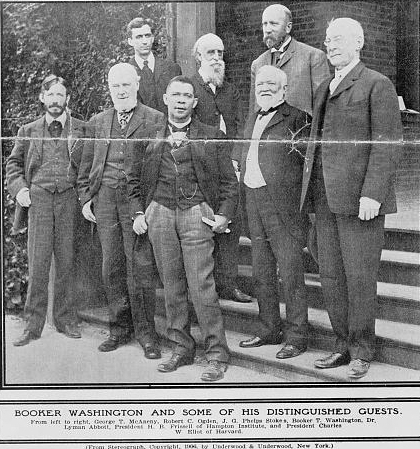
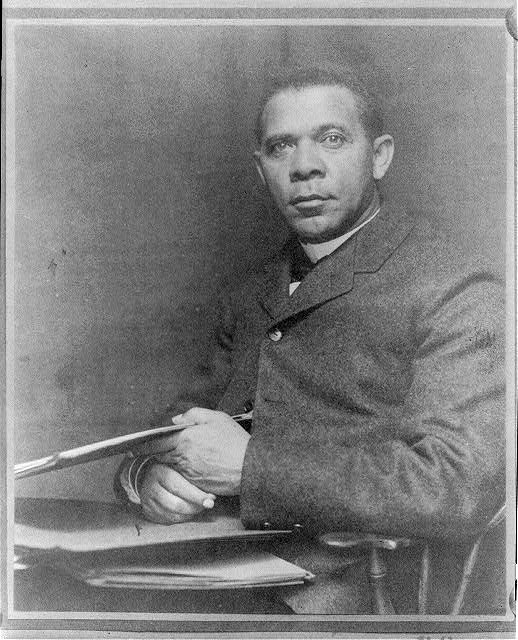
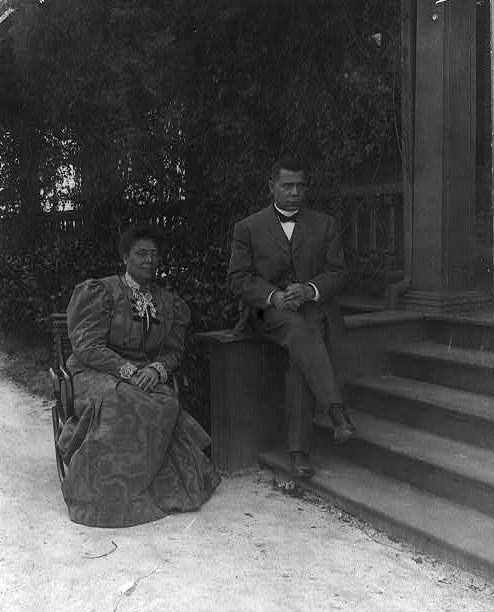
 Kathy Pinna
Kathy Pinna 